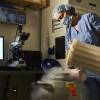Forty years ago this week, a couple from the Central Massachusetts town of Westminster, Judith and Roger Carr, had a baby girl named Elizabeth. She was the first child in the United States to be conceived via in vitro fertilization. Elizabeth Carr joined Judie Yuill on GBH's All Things Considered to talk about her life, how it all began and how she remains involved in the in vitro community. This transcript has been edited for clarity and length.
Judie Yuill: So I should start by saying "Happy birthday." It was yesterday, right?
Elizabeth Carr: It was. The entire world knows I am now 40 years old.
Yuill: What is that like?
Carr: Well, you know, my inbox was flooded, and I got a lot of lovely messages. It's a little bit surreal every birthday.
Yuill: I bet it is. Now, tell us how your parents came to rely on in vitro fertilization.
Carr: So my parents basically had trouble staying pregnant. My mother had something called three ectopic pregnancies. And as such, she had to have her fallopian tubes removed, which meant that the normal way of having a child was impossible. And when she was at her OB-GYN, she went in for a routine checkup after her fallopian tubes were removed. And he said, "Well, I don't know if this might be something for you, but I just came back from a conference and learned about something that was successful in England called in vitro. Maybe you should check it out." And that was it.
Yuill: So you're from Westminster, but you were actually born in Virginia, in part because in vitro fertilization was illegal in Massachusetts at the time. Why was that?
Carr: That's right. So essentially because IVF was a brand new, unknown technology that only had been successful in England. There was no public funding for IVF. And so any clinic that wanted to start and operate basically had to jump through a ton of hoops and had to be entirely privately funded. Actually, a former patient of my doctor, Georgiana Jones, is the reason that a clinic was even started at all. She actually donated just the right amount of money in order to form a clinic in Virginia.
Yuill: Now, sometimes people like you are referred to as "test tube babies," but that's not accurate, is it?
Carr: No, and it's a term I wish would go away forever and never come back. It's inaccurate because no test tubes are used at all. Actually, the term "in vitro" comes from the Latin under glass, which, you know, the procedure essentially is done in a petri dish. And so I always kind of laughed that the term test tube baby stuck because it's such a wildly inaccurate term.
Yuill: And I understand you're still very much a part of the in vitro community.
Carr: Yes, absolutely. So my day job is as a patient advocate at a pre-implantation genetic testing company called Genomic Prediction. Kind of by sideline, if you will, I have a book coming out in January about my life experience, and [I am] a patient advocate for organizations such as Resolve, the national infertility association.
Yuill: Now you've got to tell us the title of your book.
Carr: Oh, it's called "Under the Microscope" because my first "baby photo" is at 3 cells old under a Nikon microscope.
Yuill: That's pretty unique.
Carr: Yeah, absolutely. It's an interesting one to explain to friends. When they come over, they all go, "What are those three blobs?"
Yuill: That's your baby photo. That's right. Now what does your life seem like and look like now, 40 years later?
Carr: You know, it's pretty normal. You know, I just try and keep up with my 11-year-old son and my very busy and talented husband, who is a photographer and our dog. And we live a quiet life here in New Hampshire. I try to always make time for people who are struggling with infertility because I want to make sure that they know what options are out there. IVF is not the only option that's available, and it's so important for people to know about what they can do.
Yuill: But what's it like for you to know you played such a big role in helping people have the babies that they've been longing for?
Carr: My running joke is that I just showed up. I didn't do anything. My parents and the doctors and all of the people involved really did the heavy lifting. I am so humbled that I have the privilege of hearing people's very personal and painful stories when they're experiencing infertility. And to me, my parents and I have always lived by the philosophy that we wanted to tell our stories so that if it would help just one other person, then this lifelong lack of privacy essentially would be worth it.








